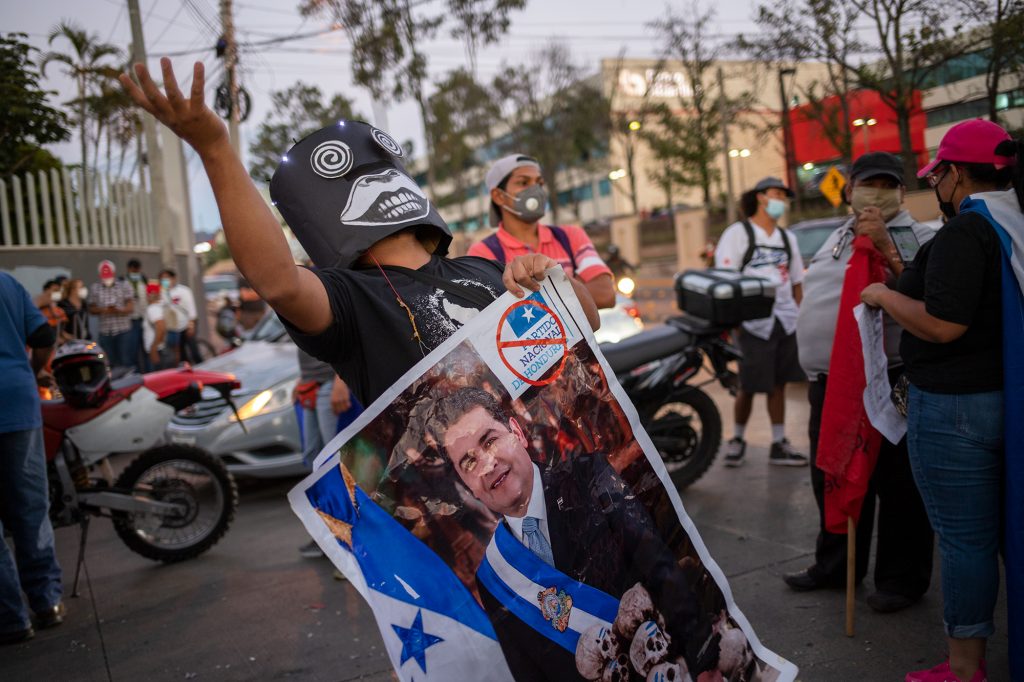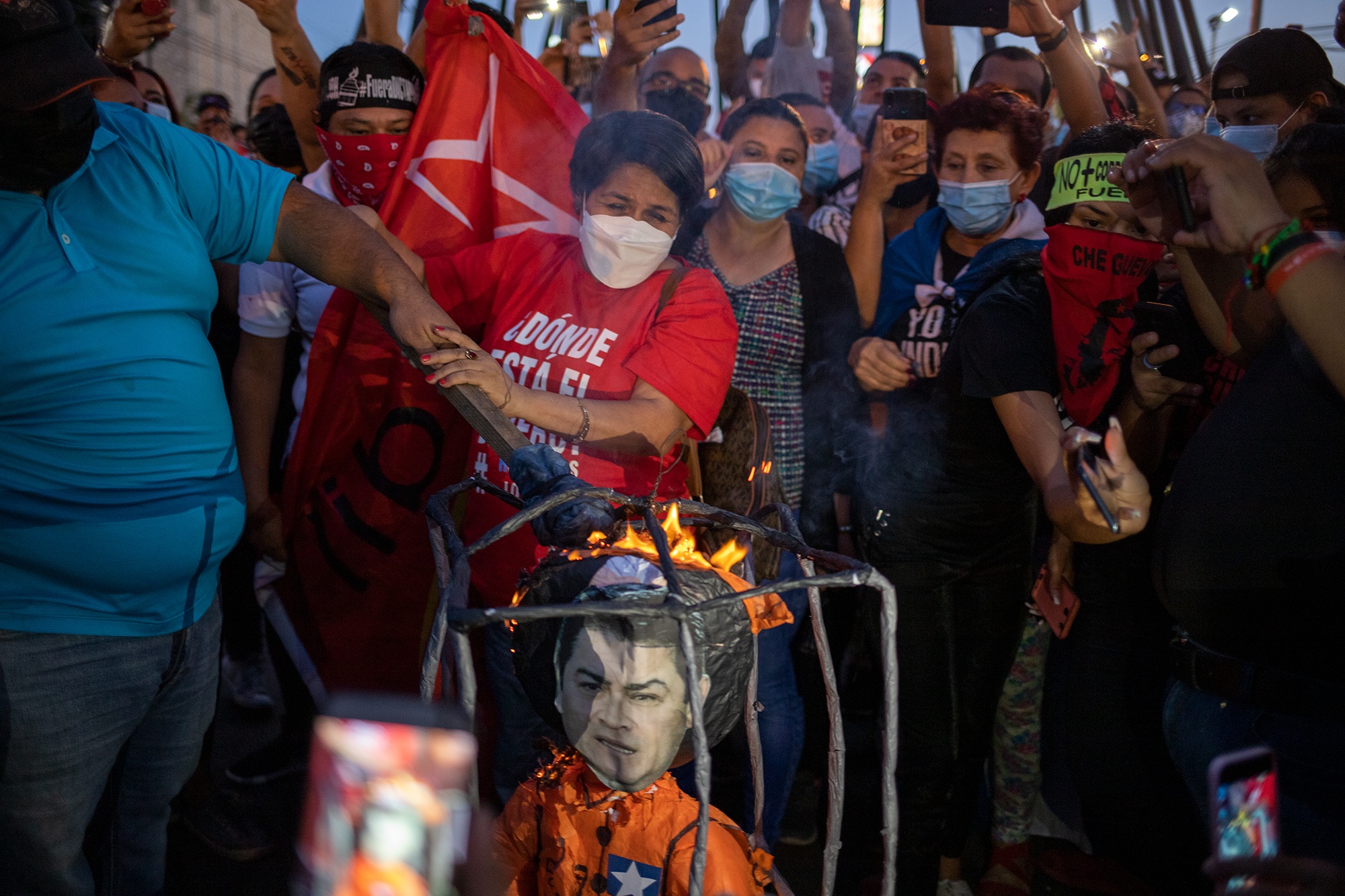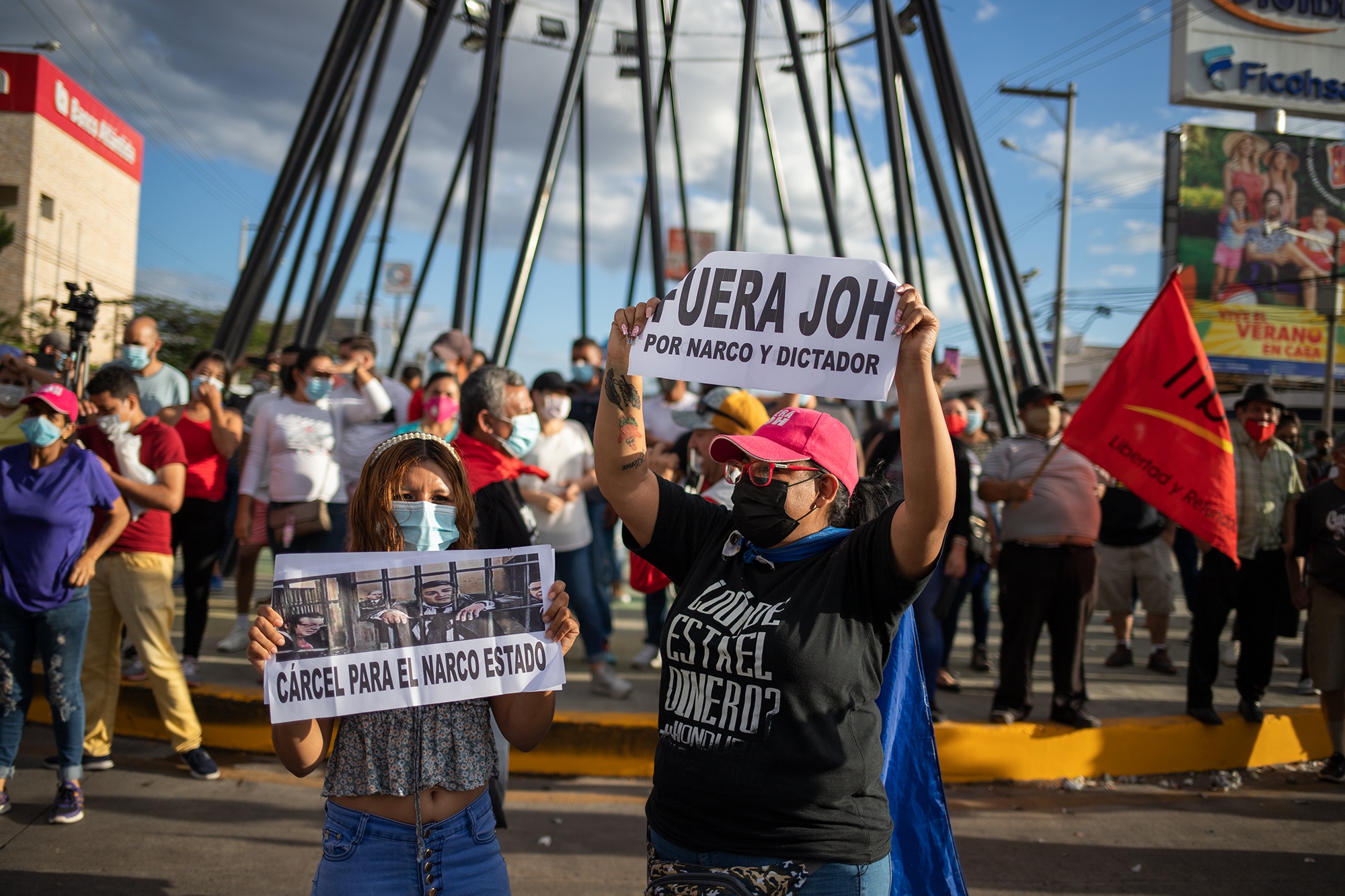The Hernández administration spent nearly US$4 million dollars over the last five years on lobbyists in the United States. Federal prosecutors in New York claimed that a lobbyist tried to pressure them during the trial of Tony Hernandez, the president’s brother who was recently sentenced to life imprisonment plus thirty years for drug trafficking. Some political analysts think this money was in vain because any overtures towards the Biden administration will be undermined by the Hernandez administration’s corruption and links to drug trafficking.
Texto: Vienna Herrera
Fotografías de Martín Cálix
“The conviction and sentencing of Tony Hernandez is a reminder that there is no position powerful enough to shield you from facing justice when you violate U.S. drug laws,” said Wendy Woolcok
, the agent in charge of the U.S. Drug Enforcement Administration’s Special Operations Division, after President Hernandez’s brother received a prison sentence of life plus 30 years and had to forfeit US$138.5 million for importing 185,000 kilos of cocaine into the United States.
During his sentencing hearing, Judge Kevin Castel declared that Tony Hernandez’s case involved “state-sponsored” drug trafficking. All the damaging information that has been made public during the trials of Tony Hernandez and other drug traffickers has driven President Hernandez to warn the United States in press conferences and social media posts that his “cooperative relationship” with the U.S. is at risk.
“If the United States rewards narcos for their false testimony, its international alliance with Honduras and other countries will collapse … this is the magic wand that narcos will use to destroy cooperation between our countries,” he said in a Twitter thread.
This strategy of veiled threats was also highlighted by the Washington Post in an April 1 article reporting that the Honduran government paid the Arnold & Porter law firm US$475,000 in 2019 to pressure prosecutors during the Tony Hernandez trial. The prosecutors claimed that in September 2019, Arnold & Porter lobbyists warned them of “collateral consequences” related to U.S. military bases in Honduras, as well as “unrelated immigration matters.”
According to the FARA (Foreign Agents Registration Act) database for agents of foreign countries in the United States, between 2016 and 2021, the Hernandez administration paid US$3,289,194 to Gus West Government Affairs, Inc., in a failed public relations effort to improve its relationship with the United States. Added to the Arnold & Porter contract, the Honduran government spent US$3,764,194 over the last five years to improve its image in the United States.
According to the Washington Post investigation, Arnold & Porter also lobbied various federal departments during then president Donald Trump’s administration. The article notes that one of the firm’s partners is John B. Bellinger III, a former legal advisor to the State Department during the administration of George W. Bush. After the Arnold & Porter contract with the Honduran government was reported, the Ministry of Finance published a statement claiming that the firm was hired to “provide legal services related to the issuance of a sovereign bond in the international capital markets,” and to support and advise the ministry in this effort.
However, the Arnold & Porter filing in the FARA database pertaining to its contract with the Honduran government states that while the firm was hired to provide legal services in connection with an international capital markets transaction, it also says that “we will represent you with respect to this matter and any additional matters as we may mutually agree,” and that it will “hold your information and secrets in confidence”. The contract also states that “we cannot make any promises or guarantees to you concerning the outcome of the matter for which you have retained us and nothing in this engagement letter shall be construed as such a promise or guarantee”.
The FARA filing also indicates that Arnold & Porter provided services to the Honduran government between August and November 2019 when the Tony Hernandez trial was being conducted.
Read our report; The narrow road ahead for Honduran president Juan Orlando Hernández
Dana Frank, Professor Emeritus of History at the University of California, Santa Cruz, says that the money spent on lobbyists only serves to highlight President Hernandez’s guilt and his shameful ties to drug trafficking.
“The money spent on these lobbyists bought little, and instead revealed how comically pathetic Hernandez and his cronies are, and how cowardly they are to use the Honduran people’s money to try to clean up their images and avoid prison. The Southern District of New York federal court has an impeccable reputation for probity,” she says.
Eric Olson, Director of Policy and Strategic Initiatives for the Seattle International Foundation, believes that there has been long-standing concern about the human rights situation, corruption, and absence of the rule of law in Honduras. “The main person responsible for this situation is President Juan Orlando Hernandez. And it has been going on long before these federal cases were prosecuted. This case [the Tony Hernandez trial] reaffirms to everyone that the president of Honduras has very dark ties to corruption, the world of illegal drugs, and crime,” he says.
Professor Frank says that the Hernandez administration is well-known for its corruption and ties to drug trafficking, citing the eight U.S. senators that introduced the Honduras Human Rights and Anti-Corruption Act of 2021, which seeks to sanction Hernandez and suspend U.S. security aid to Honduras.
Also, 48 U.S. Representatives have signed the Berta Caceres Human Rights in Honduras Act, which aims to suspend U.S. funding for police and military operations, and prohibits the disbursement of international loans that provide security assistance unless the Honduran government investigates and prosecutes gross human rights violations committed by its police and military forces.
Frank says that it is important to remember that the United States District Court for the Southern District of New York is independent of the White House and the State Department. Nevertheless, the Biden administration is working closely with Honduran Attorney General Oscar Chinchilla and Security Minister Julian Pacheco despite evidence of their ties to narcos.
“Biden is under increasing pressure from Congress and the media, including conservative publications like the Washington Post, to cut ties with Hernandez,” she says.
A tense relationship with the United States
Ricardo Zuñiga, the Biden administration’s Special Envoy for the Northern Triangle (Guatemala, El Salvador and Honduras), traveled to the region to meet with government representatives and civic organizations, but did not visit Honduras. The purpose of Zuñiga’s trip was to begin to develop a plan for allocating the US$4 billion earmarked by the Biden administration to reduce migration from Central America.
For @Eric_Latam, Ricardo Zuñiga's decision not to go to Honduras “was very intentional and a clear sign that he will not embrace or provide any public support to President Juan Orlando Hernández.”
When asked in a press conference why Zuñiga wasn’t going to visit Honduras on this trip, State Department spokesperson Ned Price replied that they would meet with “appropriate” Honduran officials and support those committed to fighting corruption. “Our goal must be to address the root causes of migration if we are to find a long-term solution to this challenge,” he said.
Zuñiga’s decision not to travel to Honduras has been the subject of great debate in the country, and local analysts interpret this as a rejection of President Hernandez. In response, Foreign Minister Lisandro Rosales claimed that Honduras was not being excluded and that he has been communicating with the Biden administration since February. “I am happy that El Salvador and Guatemala are now initiating dialogue with the United States. Honduras started its own dialogue on February 4, so we are further along and are already discussing specific issues,” said Rosales.
Shortly after the meeting between Zuñiga and the Honduran delegation, Juan Gonzalez, Deputy Assistant Secretary of State for Western Hemisphere Affairs with responsibility for Central America and the Caribbean, said in an April 11 interview on CNN en Español, “He [Hernández] is currently the elected president of Honduras, so we are going to work with his government and find areas of common interest.”
However, Eric Olson says that Gonzalez’s statement should be carefully analyzed. “He says that they are going to work with the [Honduran] government; he did not say ‘We are going to work with Juan Orlando Hernandez.’ Perhaps this nuance is not well understood. I think he said that while [Hernández] is the current president, they are going to look for other avenues to further the U.S.-Honduras relationship, which is why they haven’t wanted to go to Honduras or appear publicly with him,” said Olson, who believes these decisions are closely linked to the cases tried in the Southern District Court of New York.
Meanwhile, Admiral Craig Faller, who heads the U.S. Southern Command, publicly stated that the Honduran government has been a key partner in the fight against drug trafficking in the region.
Professor Frank believes that U.S. military support of Honduran security forces should not be ignored, since this support continues “despite enormous evidence that [Honduran security forces] collaborate with drug traffickers at the highest level, including President Hernandez.”
“Gonzalez and Zuñiga have also mentioned new areas of collaboration with Honduran prosecutors. Of course we support the brave ones, the good ones, but how is the U.S. going to avoid dealing with [Attorney General] Oscar Chinchilla at the top, who is so corrupt and so loyal to JOH? An Attorney General who has been silent on opposition repression and the illegal re-election of Hernández? We have to pay attention to what has not been said. Gonzalez and Zuñiga have not addressed the Honduran military’s corruption and repression,” he said.
Adriana Beltran, director of the Citizen Security Program at the Washington Office on Latin America (WOLA), believes that the Biden administration must develop a strategy that prioritizes the fight against corruption. “It must be a long-term strategy because the challenges are enormous, and it must encompass political and diplomatic measures or actions that clearly communicate that the Biden administration will not tolerate corruption. This administration has many tools at its disposal to execute such a strategy.”
One of the tools mentioned by Beltran is H.R.2615 – United States-Northern Triangle Enhanced Engagement Act, known as the “Engel List”. This bill was enacted by the U.S. House of Representatives on December 22, 2020, and aims to impose U.S. sanctions on individuals included on the list, including cancellation of U.S. visas.
The list must be submitted 180 days after its approval and then resubmitted on an annual basis. In an editorial for Contracorriente, historian and political scientist Otto Argueta wrote, “But corruption is a political problem that can’t be fixed with some institutional engineering. This is the biggest challenge for the new U.S. law. Money is not the only reason politicians and business people turn to corruption. It’s also because of the power they can grab, the opportunity to hold onto that power, and the satisfaction of getting away with it all.”
@Eric_Latam acknowledges that U.S. taxpayers don’t want to send money to Honduras that will be stolen by the country’s elites, but notes urgent needs in the region, such as famine, the pandemic and natural disasters.
Olson says, “The challenge today is how to channel that money﹣that foreign aid and support﹣into these countries without strengthening the elites. My preference is to support independent organizations that have a local presence and the capacity to implement projects without government participation. It’s also important to support and recognize government officials that are able to function independently.”
Professor Dana Frank says that she and other like-minded U.S. citizens will continue to pressure their government because they are outraged that their taxes “support not only Hernández, but also his administration’s neoliberal extractivism, public health system, hostility towards labor unions, and destruction of Indigenous, Afro-indigenous and peasant communities.”








